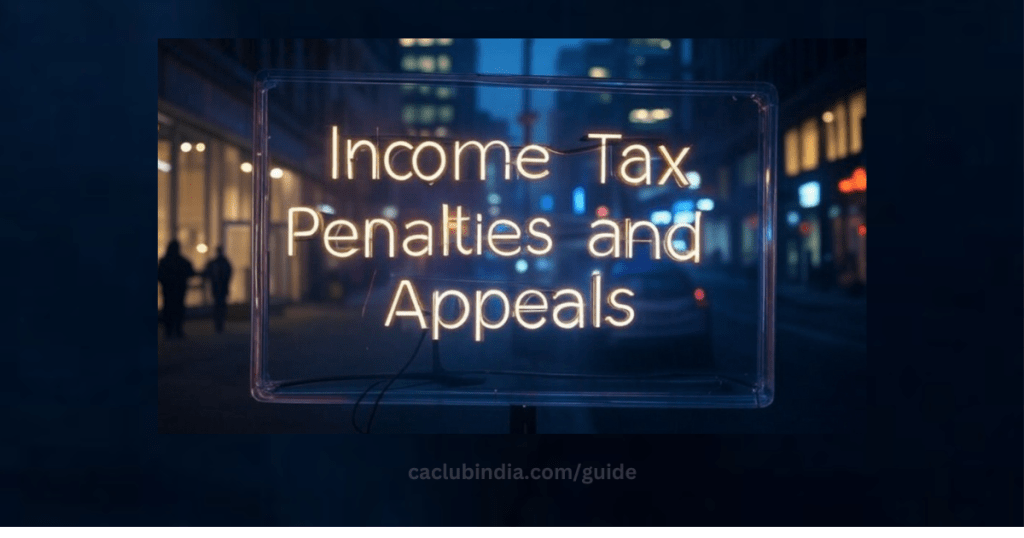
Introduction
Taxpayers are required to comply with tax laws and regulations, but mistakes, delays, or omissions can lead to penalties. Understanding the types of income tax penalties, the process of assessment, and the appeals process is crucial for taxpayers to protect their rights and minimize financial liabilities.
Common Income Tax Penalties
Failure to File Penalty
- Imposed when a taxpayer does not file their tax return by the due date.
- Generally calculated as a percentage of unpaid taxes for each month the return is late.
- The penalty increases the longer the delay persists.
Failure to Pay Penalty
- Applied when taxes are not paid by the deadline, even if the return is filed.
- The penalty accrues monthly as a percentage of the unpaid tax amount.
- Interest is also charged on the unpaid balance.
Accuracy-Related Penalty
- Imposed for substantial understatements of income tax due to negligence or disregard of rules.
- Typically 20% of the underpaid tax.
- Applies to misstatements that lead to significant tax underpayment.
Fraud Penalty
- A severe penalty for intentional tax evasion.
- Can amount to 75% of the underpaid tax.
- Requires the IRS to establish fraudulent intent.
Failure to Deposit Penalty
- Applied when businesses fail to make required tax deposits on time.
- The penalty varies based on the length of the delay.
- Can be as high as 15% if deposits are significantly overdue.
Assessment of Penalties
The IRS or relevant tax authority assesses penalties based on reported tax data, audits, or discrepancies. Taxpayers receive a notice detailing the penalty, the reason for the assessment, and the total amount owed.
The IRS considers factors such as prior compliance history, intent, and mitigating circumstances before finalizing penalties.
Appealing a Tax Penalty
Taxpayers who believe a penalty is unjustified can appeal through the following steps:
Request for Penalty Abatement
- Taxpayers can request abatement if they have reasonable cause, such as serious illness, natural disaster, or reliance on incorrect professional advice.
- The IRS may waive penalties if adequate documentation is provided.
- First-time penalty abatement is available for taxpayers with a history of compliance.
Filing a Protest
- If an abatement request is denied, taxpayers may file a formal protest with the IRS Independent Office of Appeals.
- The protest must include a detailed explanation of the disagreement and supporting evidence.
- Must be filed within a specified timeframe stated in the IRS notice.
Appeals Conference
- The taxpayer may have an informal hearing with an Appeals Officer.
- If a resolution is reached, a settlement agreement is made.
- The officer considers legal and factual arguments before making a determination.
Tax Court Litigation
- If the appeal is unsuccessful, taxpayers can file a petition with the U.S. Tax Court, District Court, or Court of Federal Claims.
- This process involves legal representation and court hearings.
- Filing deadlines and procedures vary depending on the court.
Best Practices for Avoiding Penalties
- File and pay taxes on time: Ensure tax returns are submitted before the deadline.
- Maintain accurate records: Keep proper documentation to support tax filings.
- Consult a tax professional: Seek expert advice to avoid errors and ensure compliance.
- Use electronic filing and payments: This reduces the risk of lost paperwork and delays.
- Monitor IRS notices: Respond promptly to any IRS correspondence to prevent escalation.
Conclusion
Understanding income tax penalties and the appeals process helps taxpayers manage their obligations effectively. If faced with a penalty, timely action, thorough documentation, and knowledge of legal options can improve the chances of a favorable resolution.
Consulting a tax professional or attorney may also be beneficial to navigate complex cases. By proactively addressing tax compliance, individuals and businesses can minimize financial risks and maintain a good standing with tax authorities.

